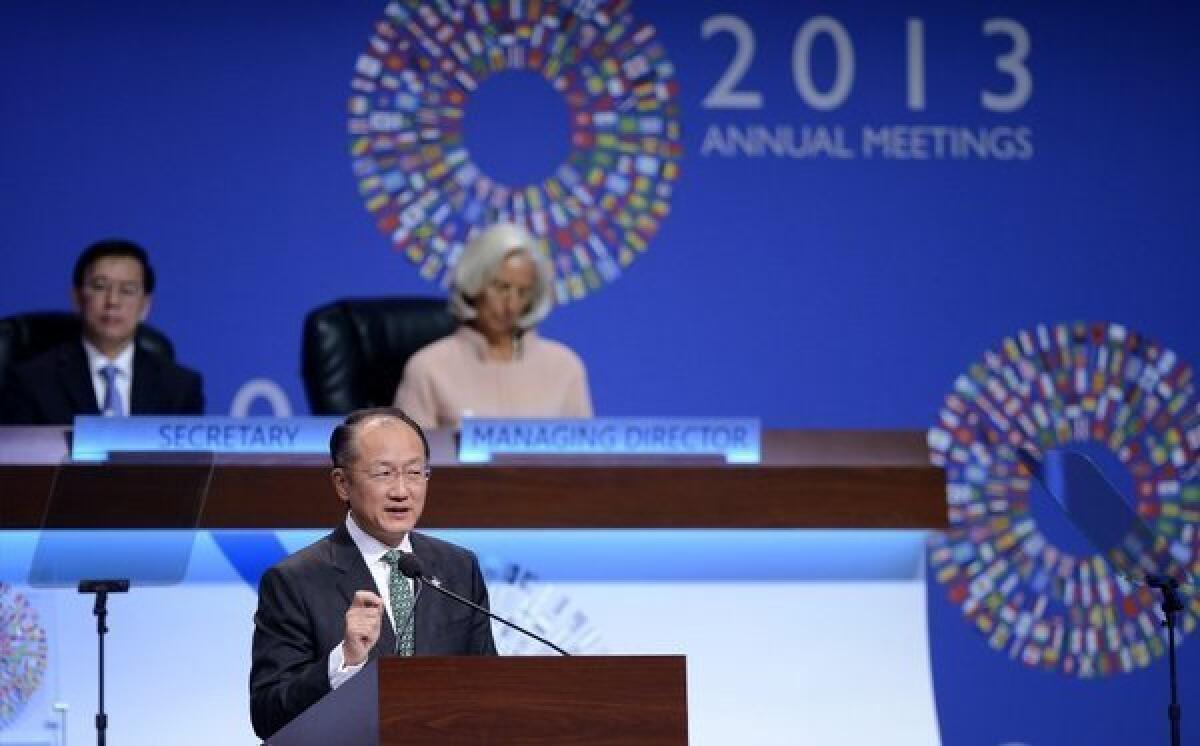World finance leaders sound alarm on U.S. debt ceiling

- Share via
WASHINGTON -- It wasn’t so long ago that Europe and its debt troubles were the dominant themes whenever global finance leaders got together. Now the focus -- and pressure -- are squarely on the United States, as the annual meetings of the International Monetary Fund and World Bank this week illustrate.
The immediate flash point, of course, is the political gridlock in Washington that has shut down big chunks of the federal government and sparked fears that lawmakers will fail to raise the debt ceiling in time, potentially leading to a U.S. default and devastating consequences. Economists and officials at the meetings this week have warned of the risk of another global financial crisis and a recession possibly even deeper than the last one.
In addressing officials and delegates representing 188 nations, Jim Yong Kim, World Bank’s president, on Friday implored U.S. officials to end the standoff over the debt limit, saying the situation had already unsettled markets and threatened to do particular harm to developing countries and the poor -- the World Bank’s main customers.
For sure, it would not help Kim meet the organization’s goal of eliminating extreme poverty by 2030. About 400 million children are among those living on less than $1.25 a day, he said.
“We urge policymakers here in Washington to come to a resolution as quickly as possible to avoid what could be catastrophic impacts from a default,” he said. “Uncertainty and volatility make it more difficult for developing countries to access needed finance, and this would both slow investment and negatively impact growth. And the poor and vulnerable would suffer the most.”
Even without the stalemate over the budget, the U.S. was hearing increasing concerns from developing countries and officials in the IMF about the effect of Federal Reserve policies. And many have complained about the holdup in the U.S. approval of an overhaul of the IMF’s governance system that would give greater voice to emerging countries such as China and India.
For the IMF, the new narrative for the global economy is the shift in relative performance: Advanced economies, including a reviving Europe, are looking a little better, while developing and emerging-market economies have slowed.
Christine Lagarde, the IMF’s managing editor, has warned that this shift could be trouble for global growth if central banks in advanced economies -- really the Fed -- mismanage a withdrawal of monetary stimulus, prompting a sharp reversal of capital flows and other shocks that could deepen a slowdown in developing economies.
President Obama’s appointment this week of Janet L. Yellen to succeed Fed Chairman Ben S. Bernanke may have brought relief to some foreign central bank governors and finance officials in Washington. Yellen, currently the Fed’s vice chair, is seen as a strong advocate of using monetary policy to combat slow growth and high unemployment, and analysts say she won’t be in a hurry to pull back on stimulus.
Lagarde, however, did not sound optimistic about an imminent ratification of the IMF’s new governance structure, which is an important part of the fund’s effort to better reflect and establish greater credibility in a world “where economic power will be far more dispersed across all regions.”
Obama and other global leaders had agreed in 2010 to adjust the IMF’s voting-power balance by the end of 2012, but U.S. lawmakers have yet to approve the change. And now, seeing the Obama administration and Congress preoccupied and warring over the budget, few see a final deal coming anytime soon.
“I’m very hopeful -- I wish I was confident -- that it will happen,” Lagarde said Friday.
For world finance leaders, one big concern about the looming debt ceiling problem is that it could have a direct bearing on their national treasuries as well, as many hold U.S. bonds. If the U.S. were to default, stocks would likely plunge and threaten a global financial system that relies heavily on U.S. Treasury notes.
Anton Siluanov, Russia’s finance minister, noted Friday that about 45% of his country’s foreign reserves are U.S. debt. But he said that at this point, there was no need for Russia to adjust its strategy regarding foreign reserves.
The U.S. debt ceiling was a major topic among finance ministers and central bankers, who met on the sidelines of the IMF and World Bank meetings, which are to end Saturday. “We discussed various scenarios of possible developments, but the optimists prevailed,” Siluanov said.
A U.S. Treasury official said Friday that Treasury Secretary Jacob J. Lew shared his sense of urgency and hopefulness with fellow ministers, but did not predict when the problem would be resolved.
U.S.-Russia relations have been deeply strained in recent months, and Russian officials at the Group of 20 major economies’ summit meeting in Russia last month criticized the U.S. on a number of fronts. But Siluanov on Friday repeatedly expressed empathy for what U.S. officials were going through, naming in particular Lew, who had canceled a meeting with the French finance minister so he could attend a White House session with Senate Republicans on the budget.
“The administration is doing everything it can to resolve this,” Siluanov said. “No one benefits from the uncertainty. It’s making a negative impact on all countries. We are hoping that the U.S. administration and the U.S. Congress will resolve, will settle this situation and the uncertainty we have today will disappear in the next few days.”
ALSO:
Budget stalemate could end talk of the Fed tapering its stimulus
IMF cuts global economic outlook, warns of U.S. ‘fiscal accidents’
Treasury warns default could cause worse financial crisis than 2008
More to Read
Inside the business of entertainment
The Wide Shot brings you news, analysis and insights on everything from streaming wars to production — and what it all means for the future.
You may occasionally receive promotional content from the Los Angeles Times.








